For sun-based cooking, you'll want marinades that enhance rather than overpower your meat's natural flavors. Start with a 3:1 ratio of oil to acid (like vinegar or citrus juice), then add crushed garlic and herbs for depth. Stick to lean cuts from round, sirloin, or loin areas, and maintain uniform thickness around 3mm for even cooking. Don't marinate longer than 2-3 hours with acidic mixtures to avoid mushiness, and always keep marinating meat refrigerated at 40°F or below. For ideal results, use glass or stainless-steel containers and rotate meat periodically. Understanding these fundamentals will set you up for solar cooking success.
Sun-Ready Meat Marinade Ingredients
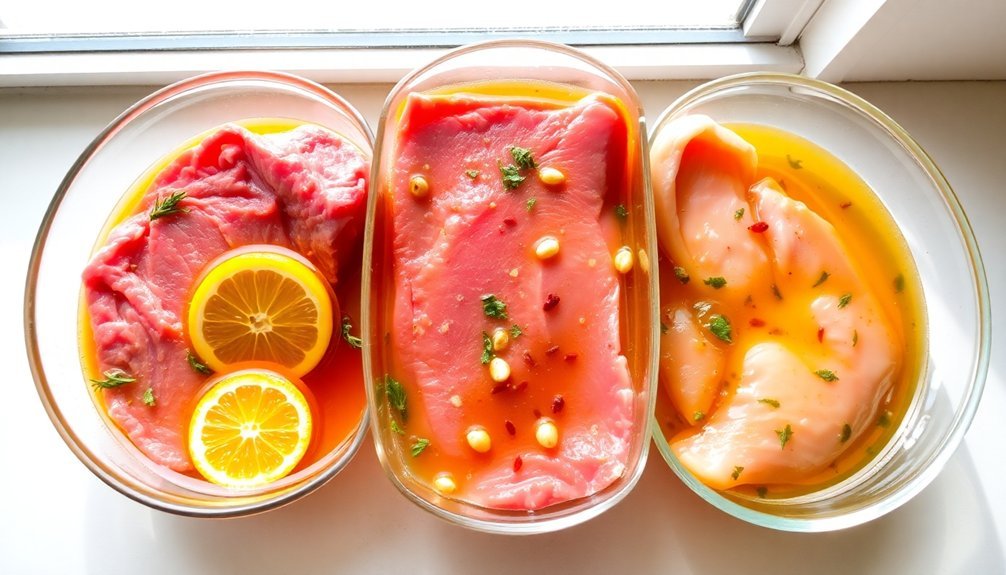
A successful sun-cooked meal starts with properly marinated meat using four essential component categories: acids, oils, flavor enhancers, and balancing agents.
For acids, you'll want to use vinegar varieties like white wine or apple cider, or opt for citrus juices from lemons and oranges. Mix your acid with olive oil or another cooking oil in a three-to-one ratio to guarantee even distribution across the meat. Following Lidia's recipe, red wine marinade creates an excellent base for sun-cooking methods.
Add flavor enhancers like crushed garlic, fresh herbs, or soy sauce to build depth.
Don't forget your balancing agents – salt and sugar can help perfect the taste, while yogurt or buttermilk will tenderize the meat naturally.
Remember to limit acidic marinades to 2-3 hours to maintain ideal texture and prevent mushiness or bitterness in your sun-cooked dishes.
Ideal Meat Cuts for Solar
When selecting meat for solar cooking, lean cuts from the round, sirloin, or loin areas provide the best results.
You'll want to avoid cuts with excessive fat or tendons, as these can become rubbery during the cooking process.
If you're working with tougher cuts like chuck, brisket, or shank, don't worry – the slow, low heat of solar cooking will help break down the connective tissues, making them tender and flavorful.
For best results, cut your meat to a uniform thickness of about 3 millimeters, especially when making jerky.
Before cooking, remove all packaging and rinse the meat under cold water.
Pat it dry and consider browning it in a hot pan first to enhance flavor.
The tender and juicy meat produced by solar cooking makes it an excellent choice compared to traditional oven methods.
Remember to use clean cutting boards and choose seasonings that'll complement your meat's natural taste.
Proper Marination Times and Temperatures

Successful marination requires careful attention to both timing and temperature control.
You'll want to marinate steaks, chops, and poultry pieces for 2-4 hours, while whole roasts and whole poultry need 4-6 hours or overnight. For seafood like prawns and squid, stick to 1-2 hours to prevent texture breakdown.
Always marinate in your refrigerator at or below 40°F (4°C) to avoid dangerous bacterial growth. Prepare ingredients in a nonreactive container to prevent any unwanted chemical reactions with the marinade.
Don't leave meat at room temperature, as this puts it in the risky "danger zone" between 40°F and 140°F.
Use about 1/2 cup of marinade per pound of meat in a sealed container or bag, rotating occasionally for even coating.
Remember that marinades work better on thin cuts than thick ones, as they'll primarily flavor the surface rather than penetrate deeply into larger pieces.
Safe Marinade Storage Methods
Proper storage of marinated meat goes hand-in-hand with safe timing and temperature control.
You'll want to store your marinated meat in airtight, non-reactive containers like glass, stainless steel, or sealed plastic bags. Don't use aluminum foil or pottery, as they can react with the marinade's acids.
Place your marinating meat on the bottom shelf of your refrigerator at or below 40°F (4°C). This prevents any leaks from dripping onto other foods and minimizes bacterial growth.
Keep turning the meat periodically for even marinade distribution.
Never reuse marinade that's touched raw meat unless you've boiled it first. If you're storing extra unused marinade, keep it separately in the fridge.
Remember to use different plates and utensils for raw and cooked meat to prevent cross-contamination.
Solar Marination Testing Tips

Testing your marinade before solar cooking helps guarantee perfect results and prevents wasted time or ingredients.
You'll want to experiment with small portions first to understand how different marinades perform in your solar oven, as sun cooking can intensify certain flavors while diminishing others.
- Try a test piece of meat with your marinade for 15 minutes before committing to longer marination times
- Check the marinade's consistency at your solar oven's typical cooking temperature
- Document which acid-to-oil ratios work best for your specific solar setup
- Note how different cuts of meat respond to your marinades under solar conditions
- Record the ideal preheating temperature for each marinade combination
Always monitor your test pieces closely and adjust your recipe based on results.
Remember to pat the meat dry before placing it in your preheated solar oven.
Frequently Asked Questions
Can Marinated Meat Be Re-Frozen After Thawing in the Sun?
You shouldn't refreeze meat that's been thawed in the sun due to dangerous bacterial growth. This unsafe thawing method puts you at risk for foodborne illness. Always use refrigerator, cold water, or microwave instead.
What Happens if Clouds Appear During the Solar Marination Process?
If clouds appear while you're marinating in the sun, you'll experience slower marination due to reduced heat. You should extend the process time or move your meat to a warmer spot to maintain effectiveness.
Does Sun Exposure Affect the Enzymatic Activity of Fruit-Based Marinades?
Yes, sun exposure will reduce your fruit-based marinade's enzymatic activity. You'll find that direct sunlight denatures the enzymes through heat and UV radiation, making them less effective at tenderizing your meat.
Should Marinades for Sun Exposure Contain Different Salt Ratios Than Regular Ones?
You'll need less salt in sun-exposed marinades since higher temperatures increase salt's penetration rate. Stick to 1-2% salt concentration instead of the usual 3-4% to prevent over-salting your meat.
Can Certain Herbs Become Bitter When Marinated Under Direct Sunlight?
Yes, you'll find that many herbs can turn bitter under direct sunlight, as their volatile compounds break down and oxidize. Delicate herbs like basil, cilantro, and parsley are especially prone to this effect.
In Summary
You've now learned the essentials of solar-powered meat marination. By selecting sun-stable ingredients, monitoring temperatures, and following proper storage guidelines, you'll create flavorful results safely. Remember to test new marinades in small batches and adjust exposure times based on your climate. Don't forget to keep your marinating meat at food-safe temperatures throughout the process. You're ready to harness the sun's power for delicious results.

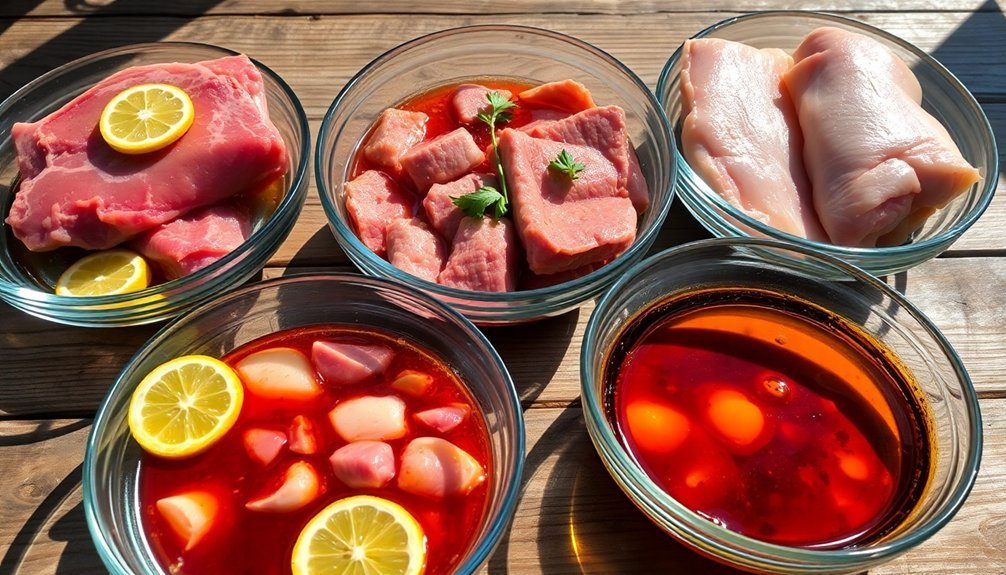
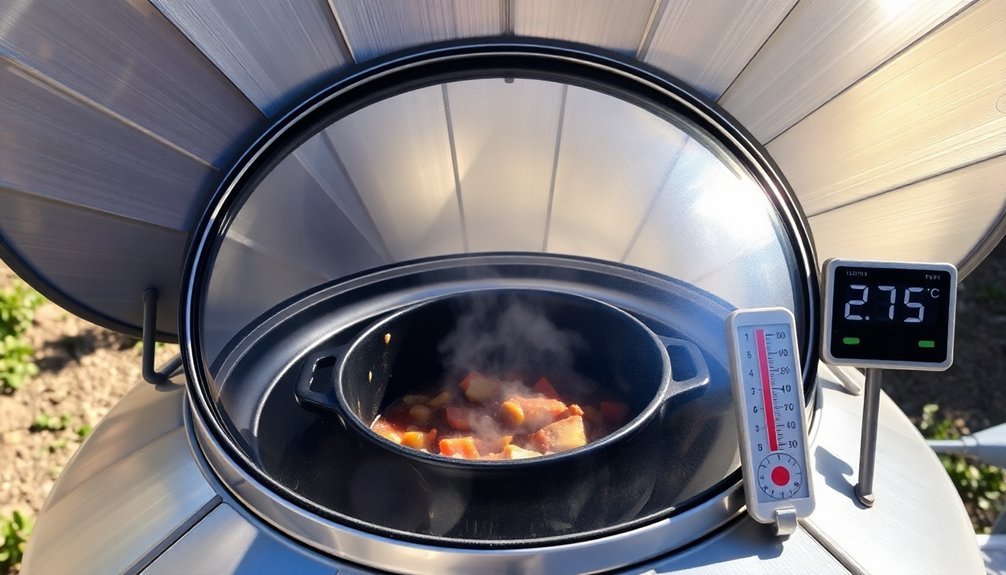
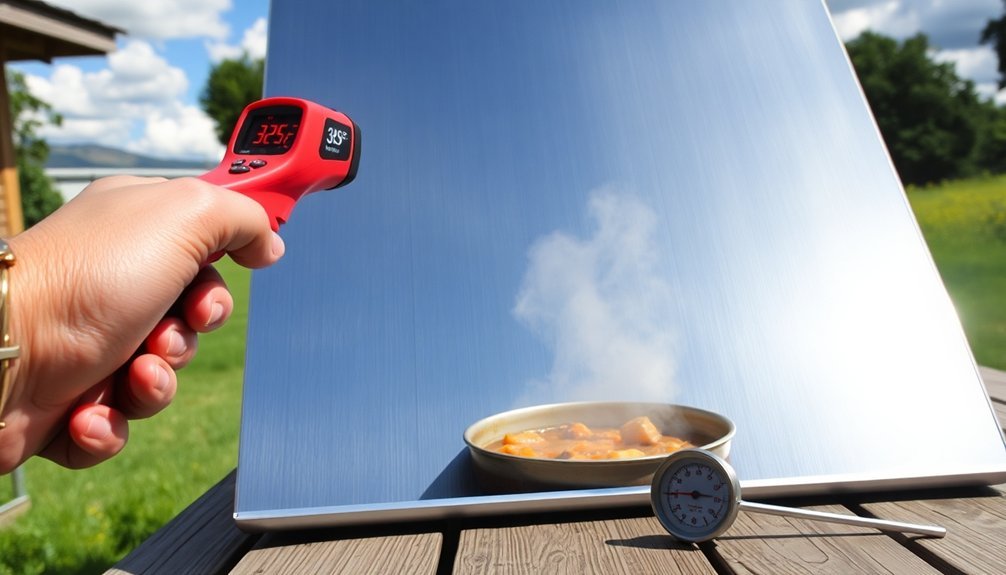
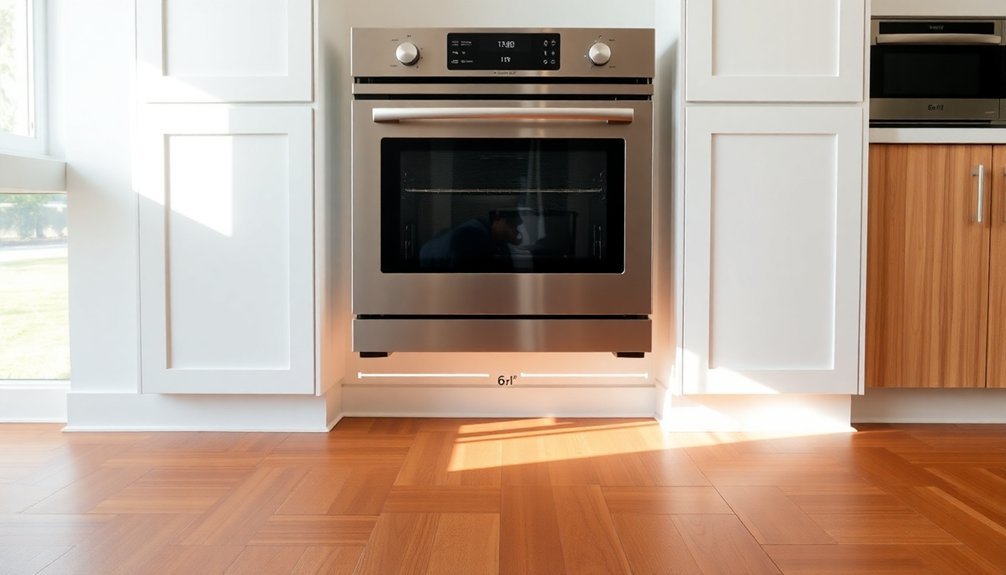
Leave a Reply